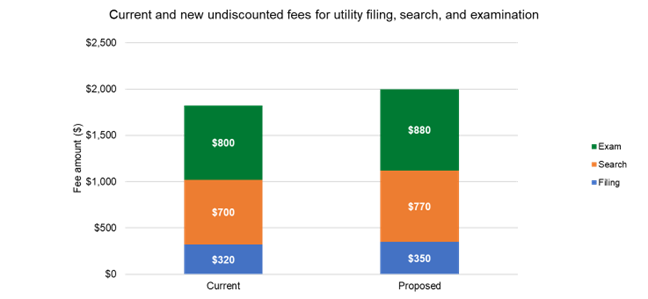USPTO Announces Fee Increases Effective January 19, 2025
- November 22, 2024
- Article
Associated People
The United States Patent and Trademark Office (USPTO) has finalized fee increases set to take effect on January 19, 2025. Certain fees will rise significantly. Below is an overview of some of the most notable changes. The “undiscounted” fees discussed below apply to large entities, but discounts are available for small and micro entities. Further details are available on the USPTO’s website.
The upcoming fee adjustments by the USPTO introduce several key changes to patent-related costs based on the following framework: An approximate 7.5% increase will apply “across the board” to all patent fees that are not “targeted." Examples of non-targeted fees include the fees for filing a terminal disclaimer and maintenance fees. Additionally, "front-end" patent fees, which include filing, search, and examination fees, will experience an additional 2.5% increase resulting in a total front-end increase of 10%:
The targeted fees will see more significant increases. Furthermore, a few new fees will be introduced, such as surcharges for filing certain “continuing applications” and new charges for Information Disclosure Statements (IDSs). These changes highlight the importance of planning and efficient patent management to mitigate the financial impact.
With respect to continuing applications, the Office will require a new surcharge of $2,700 for each continuing application filed 6 years after its earliest benefit date (“EBD”), and of $4,000 for each continuing application filed 9 years after its EBD. In this context, “continuing” includes continuation, divisional, and continuation-in-part applications (not Requests for Continued Examinations, which are covered by targeted fees discussed further below). EBD refers to the earliest filing date for which benefit is claimed under 35 U.S.C. 120, 121, 365(c), or 386(c) and § 1.78(d). The EBD is also the date from which the 20-year patent term is calculated, and thus is not the filing date of a foreign application or the filing date of a provisional application. These new surcharges should motivate applicants to file certain continuing applications before the January 19, 2025, effective date.
The targeted “excess claims” fees also merit attention: In its final rule, the USPTO is increasing the fee for each excess independent claim (in excess of three) to $600 for undiscounted entities. This amounts to a 25% increase. The USPTO is also increasing the fee for each excess total claim (in excess of 20) to $200 for undiscounted entities, which amounts to a 100% jump from the existing fee. The multiple dependent claim fee will increase by about 7.5% to $925. As a reminder, the fee for a multiple dependent claim is calculated based on the number of claims to which the multiple dependent claim refers. These changes to the claim fees should encourage the filing of preliminary amendments seeking to mitigate filing costs.
The RCE fees are other targeted fees of interest: In its final rule, the USPTO is increasing the fee for a first RCE to $1,500 (an increase of “only 10%”). USPTO is increasing the undiscounted fee for the second and subsequent RCEs to $2,860 (a 43% increase). Applicants will thus want to streamline examination, in order to avoid prolonged prosecution with multiple RCEs. This task will not be eased by the expiration of the After Final Consideration Pilot Program 2.0 (AFCP 2.0), which the USPTO decided to terminate based on the public feedback received earlier this year criticizing a proposed new fee of $500.
The USPTO is introducing a new IDS size fee based on the cumulative number of items of information provided during the pendency of the application or reexamination proceeding. “Provided” in this context refers to items cited on an IDS under § 1.98(a)(1), whether or not an actual copy of the cited item is submitted to the agency. The IDS size fee is as follows: a first amount of $200 for a cumulative number of items of information in excess of 50; a second amount of $500 for a cumulative number of items of information in excess of 100 but not exceeding 200, less any amount previously paid; and a third amount of $800 for a cumulative number of items of information in excess of 200, less any amounts previously paid. Note that the USPTO is not requiring any new fee when the cumulative number of items of information is less than 50. These new fees should not affect most applicants. According to the USPTO, applicants provide over 50 total items of information in only about 13% of applications.
Finaly, the USPTO is raising the fees for AIA trials by 25%. Specifically, for an Inter Partes Review, the request fee will be $23,750 and the post-institution fee will be $28,125.Recent Publications
Federal Circuit Holds Prosecution History Disclaimer Applicable to Design Patents
by Sana Tahir, Law Clerk and Andrew Ollis, Partner










 Counseling & Strategic Advice
Counseling & Strategic Advice IP Transactions
IP Transactions Litigation
Litigation PTAB Proceedings
PTAB Proceedings Technology Transfer
Technology Transfer Trademark & Designs
Trademark & Designs U.S. Patent Procurement (Application Drafting & Prosecution)
U.S. Patent Procurement (Application Drafting & Prosecution)








